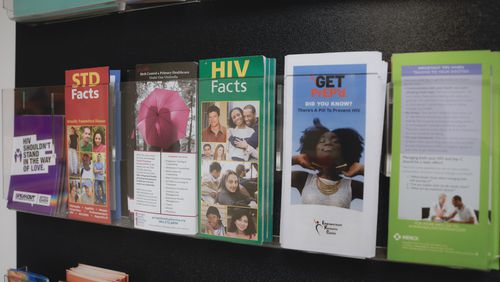When Leisha McKinley-Beach saw the recent CDC data showing that metro Atlanta had the third-highest HIV rates in the nation, she wasn’t surprised. The numbers have been high for years, and the burden hasn’t been spread equally among all Atlantans.
“When we look at new HIV diagnoses in metro Atlanta, 74% are among Black people,” McKinley-Beach, a national HIV consultant and CEO of the Black Public Health Academy, told The Atlanta Journal-Constitution. “In essence, if we end HIV for Black communities, we end it for Atlanta. That’s a significant story that’s not being told.”
HIV experts interviewed by the AJC said that until at-risk populations are folded into health insurance programs, Georgia will have a hard time ending what has become an entirely preventable epidemic – preventable because low-cost drugs can stop HIV-negative people from catching the virus, and HIV-positive people from passing it on.
“The larger political context matters,” Justin C. Smith, who directs the Campaign to End AIDS at Positive Impact Health Centers in the Atlanta area, told the AJC. “We know Medicaid matters a great deal for the effective provision of medical services. The fact that Georgia is still refusing to expand Medicaid harms us. There’s a correlation between the locations that have not expanded Medicaid — I’m thinking of cities like Miami, Memphis, and Atlanta — and extremely high HIV rates.”
Because Georgia has not accepted a full expansion of Medicaid, it has left more people in the state without insurance, making it hard to organize care for those with chronic conditions like HIV.
Only Miami and Memphis outrank Atlanta in terms of new HIV infections, according to CDC data. The common thread between all three cities, Smith emphasized, is that Georgia, Florida, and Tennessee have not expanded Medicaid.
Nationwide, Black and Hispanic males accounted for most of the new infections, and half of new HIV infections among women were in Black women, the CDC said.
The CDC data is all the more unsettling because there are drugs that can completely stop HIV transmission. The drugs are known by the shorthand “PrEP,” for pre-exposure prophylaxis, and can be prescribed to people of any sexual orientation or gender. Taken orally or intravenously, the drugs reduce the risk of contracting HIV through sexual contact by more than 99%, making them more effective than any other measure to prevent HIV, including condoms, according to the CDC.
PrEP uptake in the U.S.
Though the U.S. was the first nation to approve PrEP in 2012, many countries are doing a better job ensuring equitable access. That’s mostly due to the cost of laboratory tests and medical visits, which would be covered by insurance. While the cost of the generic form of Truvada, an oral form of PrEP, can be as low as about $30 a month in the U.S., a study by University of Virginia researchers reported the cost of starting PrEP is typically about $2,670 for uninsured patients, including about $1,000 for lab tests and medical visits. It’s possible to take PrEP on-demand as a precaution before engaging in condomless sex. But most people opt to take PrEP every day, and in that case, are scheduled for quarterly bloodwork and STI screenings. That’s why activists are driving home the point that providing people with health insurance is critical to reducing Atlanta’s frustratingly high HIV rate.
PrEP uptake in the U.S. remains notably unequal: about 94% of white people who could benefit from PrEP have been prescribed it, but only 13% of Black and 24% of Hispanic people who could benefit have been prescribed PrEP, according to HIV.gov.
Moreover, the U.S. is lagging Western Europe and some nations in Africa in overall HIV treatment and prevention. PrEP pills and quarterly blood work are free for people in Australia, New Zealand, the United Kingdom, and European Union nations including France, Germany, Sweden, and Denmark.
In Atlanta, 60.2% of people living with HIVhave achieved viral suppression from taking their medications, versus 66% nationwide, according to the U.S. government website HIV.gov. In the UK, 98% of HIV-positive people have attained viral suppression or “undetectable” status, meaning they cannot transmit the virus to anyone else.
Several African nations have outpaced the U.S. too. Botswana, Eswatini (formerly Swaziland), Rwanda, Tanzania, and Zimbabwe have already achieved the United Nations’ “95-95-95″ targets set for 2025 — 95% of people with HIV know their HIV status, 95% of people with diagnosed HIV infection receive sustained antiretroviral therapy, and 95% of people receiving antiretroviral therapy have achieved viral suppression.
Broaden Access
One solution to broaden access could be injectable forms of HIV medications given in a medical setting, said Daniel Driffin, a leading expert on HIV in Georgia and founder of THRIVE SS, a nonprofit that works to “support Black, same-gender-loving men living with HIV” in metro Atlanta. An injectable HIV medication, Apretude, was approved in 2021 by the FDA for use as PrEP, but its high cost remains a barrier to access.
“We are seeing amazing data on long-acting treatment for persons living with HIV,” Driffin told the AJC. “There are still barriers to care, such as poor transportation infrastructure and stable access to housing for people living with HIV. But injectables can reduce unnecessary burdens.”
Driffin has been on injectable treatment for more than two years. “During the pandemic, when I started to see my adherence to my daily medication change, I wanted to avoid having virus in my system. That led me to asking my physician, who is also a gay, Black man who lives in Atlanta, about other options.”
A study released in March showed that an ultra-long-acting form of Apretude, known as cabotegravir, could eventually be administered three times a year for both PrEP.
And this, ultimately, could address issues with adherence to HIV medications, otherwise known as “pill fatigue.” Many people living with HIV can expect to live as long as their peers who do not have HIV – a miracle scenario unthinkable just two decades ago. But the pills sometimes cause actual sluggishness in some, or psychological fatigue in others who, as they age, may tire of taking several prescription drugs daily.
Helping heterosexual Black women access injectable PrEP and PrEP pills will be a critical part of ending HIV in Georgia, McKinley-Beach added. “The goal is for every Black Georgian who can benefit from PrEP to have a pathway to getting PrEP. It’s a new way of thinking about HIV in this state.”
One way to broaden access, especially in rural Georgia, would be to allow pharmacists to prescribe PrEP. McKinley-Beach said laws that permit this in California, Colorado, Nevada, and Utah could serve as a template for Georgia. “Having pharmacists prescribe PrEP would be a game changer,” she said.
Despite the high numbers, Atlanta is broadening outreach efforts to queer communities of color. In March, Atlanta’s NAESM’s Total Life Care Center opened a clinic targeted specifically at Black gay and bisexual men. The city’s sexual health leaders have also succeeded in breaking down taboos around talking openly about HIV.
“The reduction in stigma is a win for Atlanta,” Tori Cooper of Human Rights Campaign told the AJC. “Education in mass media has helped. But we still need to drive home the message to lawmakers that it’s not just cheaper, but ethical, to prevent new infections.”






